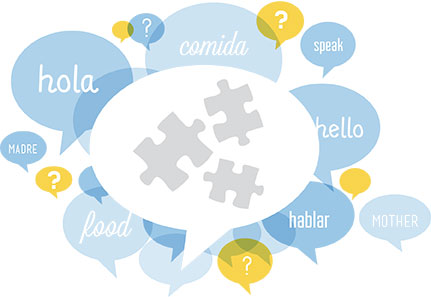Bilingual Speech Therapy for Stroke Survivors
A monthly bilingual support group at Miller Speech & Hearing Clinic offers hope for people working to regain the ability to speak.

Regaining language skills can be a challenge after suffering a stroke. (illustration © Getty Images)
Bilingual Speech Therapy for Stroke Survivors
A monthly bilingual support group at Miller Speech & Hearing Clinic offers hope for people working to regain the ability to speak.
Two days after Gaby Garcia’s father had open-heart surgery in 2009, he had a stroke and lost the ability to communicate.
“I bought him a whiteboard, but he couldn’t write anything beyond lines, which was scary because back then we didn’t know anything about aphasia,” said Garcia ’94, who immersed herself in learning about the disorder that damages the language-controlling part of the brain.
On a doctor’s recommendation, her father, Enrique Garcia, began speech therapy at TCU’s Miller Speech & Hearing Clinic in 2013. That led to his becoming a charter member of the clinic’s Bilingual Aphasia Support Group.
“Those who participate always seem so appreciative because they get to be with others who are like them and who understand their situation in a much different way than their therapists do.”
Mayra de la Rosa Luna
“There’s nothing like this support group anywhere else in North Texas,” said Laurel Lynch, an instructor of communication neuroscience and clinical methods at the Davies School of Communication Sciences & Disorders, which is part of the Harris College of Nursing & Health Sciences.
Lynch, a licensed speech-language pathologist, also oversees the clinic. “We always begin with everyone introducing themselves, not necessarily because they don’t know each other, but because it’s good practice in a safe environment for those who are struggling.”
ANSWERS FOR FAMILY MEMBERS
Stroke survivors such as Garcia gather each month at the clinic. TCU undergraduates studying speech therapy often observe while graduate students help facilitate the proceedings by answering questions from clients and their family members.
One-on-one speech therapy can help restore a person’s ability to speak, read, write or comprehend language. The support group offers current and former therapy clients a chance to practice their speaking skills in an encouraging setting.
Gaby Garcia said she appreciates the insights into the disorder the clinic’s staff and students provide during the support-group meetings. Graduate students have presented material on topics ranging from positive self-talk to apps that assist in communication. In 2016, undergraduate students studying art therapy guided participants through a hands-on project. While the group remains small – 26 attended the December meeting – Garcia said that watching clients progress has given her family tremendous hope.
Encouragement is at the heart of the group’s mission, said Juli Iracheta, a supervisor at the clinic who oversees students conducting therapy sessions and helps translate at the monthly meetings. “This is a place where our clients can express issues and talk about the problems they are facing to people who truly get what they’re going through.”
Mayra De La Rosa Luna, a second-year graduate student in speech-language pathology, added: “Those who participate always seem so appreciative because they get to be with others who are like them and who understand their situation in a much different way than their therapists do.”
Group participants don’t need to be bilingual to attend the monthly meetings. Some travel more than an hour to attend. Spouses, partners and children, who accompany them, are encouraged to ask questions and express concerns.
“Several months ago, one of the caregivers asked for a discussion on why people with aphasia often have some impairments in working with numbers,” Lynch said. “One of the clients suggested that everyone incorporate a number in some way during their introduction the next time, like mentioning their age or how many children they have.” In December, group members embraced the challenge with success.
FRUSTRATIONS AIRED
“The support group members are so passionate and welcoming, but they’re also very open and honest about their frustrations,” said Beth Finley, a speech pathologist who supervises students during therapy. “We have a higher-level client who has come such a long way that he has actually gone back to work. He is a beacon of hope to some of them who aren’t quite as far along.”
Many participants who once conversed in English and Spanish with ease have some difficulty with one language post-aphasia. “The degree in which they struggle now depends on the patient and how much of both languages they had before their stroke,” said Irmgard Payne ’94, a clinical instructor in the Davies school and a bilingual speech pathologist. “Where the injury is on the left hemisphere of the brain determines which language is mostly affected and how their impairment manifests.”
For Enrique Garcia, his fight to regain conversational fluency in English lagged behind the gains he made with his native Spanish. Despite that, his progress and positive attitude delights his family.
“We’ve only missed two meetings since the group began,” said his daughter, a licensed professional counselor in Fort Worth. “I run support groups, so I see the psychological benefits to them, and sometimes these meetings can get intense. But it’s such a great group and coming has really helped my family. I wish more people knew about it.”

Your comments are welcome
Comments
Related reading:
Features
Starpoint School’s Special Education
At age 50, the on-campus lab school is still giving students a chance to shine.
Features
Adam Fung’s Uncommon Arctic Adventure
The art professor is acting as an Arctic ambassador and filmmaker after his 19-day residency in the Far North.